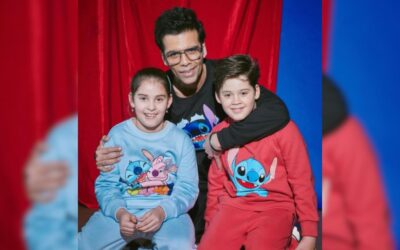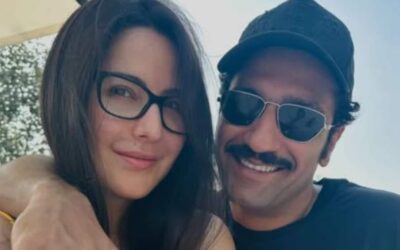
Pristine Rajshri fare sought to be tailored for the times, Bada Naam Karenge follows the meandering journey of a pair of young lovers navigating the whims and fancies of their respective families. It takes them from Maine Pyar Kiya to Vivah via several shades of Hum Aapke Hain Koun – a tortuously circuitous course.
That is what it takes for the first tentative stirrings of romance to culminate in band baaja baaraat. But no matter how thorny things turn for the lovebirds in Bada Naam Karenge, Rajshri Productions’ maiden web show, parents, uncles, aunts and friends are always at hand to offer advice, sermons and solutions.
As is the norm in family dramas of this sort, the duo starts off on the wrong foot. An Ujjain girl lands up uninvited at a house party in Mumbai. In an aside to a friend, she describes the host, a boy from an affluent, conservative Ratlam-based business family, as Aligarhi pajamas aspiring to be yoga pants.
The boy returns the favour pronto. He likens the gauche gatecrasher to poha sprinkled on penne pasta. The snarky analogies, besides voicing the would-be lovers’ first impressions about each other, define the essence of Bada Naam Karenge. The show sails on two boats. As long as the flow is placid, it is steady. At all other times, Bada Naam Karenge is a wobbly affair.
The nine-episode SonyLIV series created by Sooraj R. Barjatya is an acknowledgement by the 78-year-old banner that the world is no longer as simple as it used to be. Maine Pyar Kiya, Hum Aapke Hain Koun and Vivah, among Rajshri’s biggest box-office hits, have long been supplanted by the likes of Rocky Aur Rani Kii Prem Kahaani.
A well-to-do family in the business of selling sweets and snacks in the Tier-3 town of Ratlam dwell in a mansion that, in its garish opulence, is right out of a Karan Johar movie. It is another matter that the people who live there, to be sure, are steadfastly of the Hum Saath-Saath Hain variety.
The grammar of Bada Naam Karenge is strictly big-screen. In a poha and pasta fusion, it weds storytelling principles of decades gone by with contemporary social dynamics. Youngsters stray from the straight and narrow and yet parivaar and maan-sammaan continue to guide their actions and decisions.
The collision of familial pressures and youthful urges, if not outright corrosive, sparks trouble in paradise. Guardians of morality stand in the way of a new generation looking for the freedom to express themselves without ignoring their parents’ wishes.
Bada Naam Karenge isn’t only about loving your family. It is decidedly also about embracing your kin with unwavering fervour no matter what. It is more desi mithai stirred in plenty of ghee – which is what the family of stern patriarch Anand Rathi (Kanwaljit Singh) produces and peddles for a living – than pizza peppered with pepperoni and black olives.
The show’s apposite soundtrack neatly straddles the two divergent worlds. Original numbers composed by Anurag Saikia are supplemented with sounds and songs that recall a wide swathe of Rajshri films, from Dosti (1964) and Geet Gaata Chal (1975) to more recent releases.
Director Palash Vaswani (who helmed a bunch of Gullak episodes) and writers S. Manasvi and Vidit Tripathi work with the banner’s wedding drama template and seek to give the story a veneer of contemporaneity by incorporating themes of non-conformism and gender equality.
Bada Naam Karenge is definitely not a mess. But while it is plotted with clarity, many of its conflict points reek of obsolescence. The story takes all of seven hours to bring the young lovers and their elders to a common meeting ground.
All through its runtime, the series moves a step forward and then two steps backwards until it runs out of steam and ends where such love stories often do – at a railway station when a train is about to leave.
The girl, Surbhi Gupta (Ayesha Kaduskar) is always a step or two ahead of Rishabh Rathi (Ritik Ghanshani), whose ultra-conservative family is at the root of all the discord. When push comes to shove, she demands (without frothing at the mouth) the right to decide what is best for her. She isn’t, however, a dyed-in-the-wool rebel. The boy is even less so.
Two close-knit broods – represented by tauji Anand Rathi, his wife (Alka Amin), and his brother (Rajesh Jais) and sister-in-law (Chaitrali Lokesh Gupte) on the boy’s side; a genial mathematics professor (Jameel Khan) and his wife (Deepika Amin) on the other – confront the challenges that an increasingly tricky matchmaking process poses.
They face a string of hurdles, some that they invite upon themselves, a few erected by a disgruntled member of the extended family – the Rathis’ brother-in-law Rajesh Jaiswal (Rajesh Tailang). Cataclysmic consequences loom as the boy and the girl are drawn into situations partly of their own making, partly of the unyielding and entrenched patriarchy that they are up against.
Problems arise because, as the families meet to finalise Surbhi and Rishabh’s marriage, the lovers pretend to be strangers when they are anything but. The rest of the story centres on the couple’s increasingly desperate efforts to camouflage the truth.
The show does not give the audience as hard a time as Anand Rathi gives to his twenty-something nephew and his now-on-now-off would-be bride. But Bada Naam Karenge could definitely have done with a little more imagination in devising the hurdles in their way.
It is hard to digest that a B-school student with a thriving family business that is his for the asking and a bright young girl studying to be a virologist would, in this day and age, lie about their friendship to the point of all-out obfuscation.
The move is clearly indispensable as a plot device – without it there would be no Bada Naam Karenge as we see it play out – but in terms of logic it is too arbitrary to stand up to scrutiny. It exists only to squeeze every ounce of drama out of the clash between tradition and modernity, between custodians of family honour and proponents of individual liberty.
Although powered primarily by the two leads, relative unknowns who effortlessly slip into their pivotal roles, the show banks on the solidity that an ensemble of Kanwaljit Singh, Jameel Khan, Rajesh Tailang, Alka Amin and others impart to it. They are all at their retrained best.
Gyanendra Tripathi as a sceptical and obstructive elder brother makes an especially lasting impression. Ghanshani and Kaduskar lend freshness to the oft-repeated tale of lovers at odds with the world.
Bada Naam Karenge has avowedly big ambitions: with one foot firmly planted in the past, it strains at the leash for a dash into the future. But it has plasticine feet. The boundary it wants to push is in its sight but it never gets close enough to actually push it.
Search
Recent
- "Disappointed not to win the game", says Jos Buttler
- Rohit Sharma reveals the motive for promoting Axar Patel up the order
- Karnataka high court grants anticipatory bail to former CM BS Yediyurappa in POCSO case, quashes trial court’s order
- Con befriends woman on matrimonial site, cheats her of Rs 1.2 crore
- Developers want to avail UP’s rehab policy for 5 stalled projects, offer to withdraw cases





